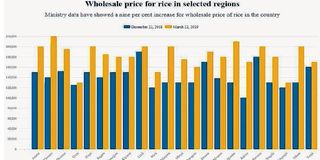Rice price up by 9 per cent in three months

Dar es Salaam. Rice prices increased by an average of nine per cent in the past three months, reports show.
Data by the Ministry of Industry, Trade and Investment indicate that the wholesale price for a 100-kilo bag of rice ranged from Sh159,260.9 to Sh192,173.9 on March 22, up from Sh146,739.1 to Sh178,217.4 on December 22, 2018.
In Dar es Salaam, a 100-kilo bag was sold at between Sh150,000 and Sh205,000, depending on rice quality. A random survey by The Citizen has established that a kilo of rice was sold at between Sh1,900 and Sh2,500 in retail on Friday last week.
Rukwa and Shinyanga had the lowest wholesale price of Sh120,000 while Lindi had the highest: at between Sh190,000 and Sh200,000 for a 100-kilo bag.
Traders attribute the price increase to decreased supply.
The Temeke Grains Agency head, Peter Sospeter, told The Citizen at the weekend: “Farmers are using their crops frugally as drought bites. Some keep it in anticipation that prices will soar.” According to Tandika market chairman Mohamed Mwekya, rice supplies normally decrease in March.
Rice is widely consumed in Tanzania. The traditional method for cultivating rice is flooding the fields while, or after, planting seedlings. This simple method requires sound planning and servicing of water damming and channelling, but reduces the growth of less robust weeds and pest plants that have no submerged growth state, and deters vermin.
Nutritionists say health benefits of rice include its ability to provide instant energy, regulate and improve bowel movements, stabilise blood sugar levels, and slow down the ageing process.
It also plays a role in providing vitamin B1 to the human body.
Other benefits include its ability to aid in skin care, boost metabolism, regulate digestion, and reduce high blood pressure. It helps in weight loss, boosts the immune system, and provides protection against dysentery and chronic diseases.




